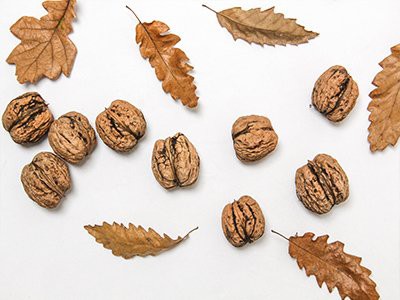- Are Walnuts Bad For Dogs?
- Symptoms Of Black Walnut Poisoning In Dogs
- What To Do If My Dog Eats Walnuts?
- Black Walnut Poisoning In Dogs Treatment
- Are Black Walnuts Bad For Dogs?
- Are English Walnuts Good For Dogs?
- Are Chopped Walnuts Bad For Dogs?
- How Many Walnuts Are Toxic To Dogs?
- Can Dogs Eat Walnut Shells?
- Can Dogs Eat Walnut Bread?
- Can Dogs Eat A Walnut? Conclusion
Dog Pregnancy Calculator And Timeline
Walnuts are not advisable for dogs. Fresh walnuts are very high in omega oils and protein. Some dogs show discontentment with nuts and if consumed may exhibit signs of diarrhea or contract hives.
The commonly available walnuts are the English walnuts available in grocery stores and are not toxic to dogs if consumed in very small quantities. However, the other type of walnut called the black walnut is very dangerous to dogs.
Most importantly, try not to feed walnuts to your dog. If in case your dog eats moldy, old, and moist walnuts, then walnut poisoning cannot be ruled out.
Are Walnuts Bad For Dogs?

Walnuts are not advisable for dogs. The high moisture content of walnuts makes them vulnerable to a certain type of black mold that is extremely toxic to dogs.
Carcinogenic toxins called mycotoxins that are produced by the fungi that grow on walnuts may cause tremors and seizures in dogs.
Also, walnuts contain very high-fat content and can cause immediate dietary problems like vomiting and diarrhea, and can develop pancreatitis.
More to that, another potential health concern is a blockage hazard which may lead to gastrointestinal blockage or perforation.
Symptoms Of Black Walnut Poisoning In Dogs
Immediate symptoms that you can notice if your dog ate a moldy walnut or a black walnut may include –
- Vomiting
- Tremors
- Seizures
Another potential problem is the gastrointestinal blockage as the shells may not pass through the intestine properly and get stuck in the intestinal walls.
Symptoms of gastrointestinal blockage are:
- Persistent vomiting
- Inflated and distended abdomen
- loss of appetite
- Weakness
If you witness any of these indications, call your vet or the Pet Poison Helpline right away as it could lead to death if left untreated immediately.
What To Do If My Dog Eats Walnuts?
If you notice any symptoms like change in behavior, vomiting, diarrhea, or even lethargy after your dog ingests walnuts, take him to the vet immediately. These could be signs of grave health issues.
Black Walnut Poisoning In Dogs Treatment
An excessive amount of walnut can cause walnut poisoning and lead to seizures. The main treatment revolves around using tranquilizers, charcoal, muscle relaxants, and inducing vomiting.
In case your dog is quivering but alert and standing, then a few tablespoons of hydrogen peroxide can induce vomiting. Bear in mind, that the sooner the toxins leave your dog’s body, the better. Whatsoever, consult your vet before treating the dog yourself.
Also, you should do this to a recumbent, depressed, sick dog because they can develop pneumonia or die.
If you witness any of these indications, call your vet or the Pet Poison Helpline right away as it could lead to death if left untreated immediately.
Are Black Walnuts Bad For Dogs?
Black walnuts contain Juglone, a poisonous substance that causes seizures or tremors in dogs. You must watch out for symptoms like vomiting and seizures if your dog happens to eat black walnuts. Take him to the vet immediately.
Are English Walnuts Good For Dogs?
English walnuts can be fed to dogs in small quantities. This type of walnut is available in stores and generally used for cooking and is considered safe for dogs if given in small quantities. However, they are still high in fat and are not an option for a treat.
Are Chopped Walnuts Bad For Dogs?
English walnuts or fresh walnuts if given in a small quantity will not harm your dog. However, black walnuts and walnuts with fungi or moldy walnuts are toxic to dogs. As walnuts have high moisture content, they are easily susceptible to fungal growth. The carcinogenic mycotoxins present in the fungi can cause tremors and convulsions.
Hence, walnuts in any form are not recommended for dogs.
How Many Walnuts Are Toxic To Dogs?
Fresh walnuts or English walnuts if given in a very small quantity in crushed form may not cause harm. Even so, walnuts in any form or any quantity are not advised for dogs.
Can Dogs Eat Walnut Shells?
Walnut shells are difficult for your dog to digest and can also break into small pieces and cause gastrointestinal perforation. Your dog may end up in surgery that could be fatal. If your furry friend happens to eat walnut shells, rush him to the doctor right away.
Other Nuts Dogs Cannot Eat
Nuts generally contain very high-fat content which can cause gastric problems.
Macadamia nuts can lead to hyperthermia, lethargy, tremors, and hind end weakness. Some of the other nuts dogs cannot eat include hickory nuts, pistachios, pecans, and almonds.
Can Dogs Eat Walnut Bread?
Walnut bread is not okay for dogs. Normally, walnuts don’t agree with the digestive system of dogs. Walnut bread has added components that are even more harmful to dogs. This may even lead to organ damage if eaten regularly or in large quantities.
Can Dogs Eat A Walnut? Conclusion
According to vets, English walnuts are fine only if given in a very small quantity and crushed. Black walnuts are highly toxic to dogs. Walnuts contain omega oils and high levels of protein. They can cause diarrhea, hives, and vomiting. Dogs are also prone to seizures and tremors from walnut shells.
If you suspect that your dog ate walnuts or walnut shells, seek your vet’s advice right away.


















